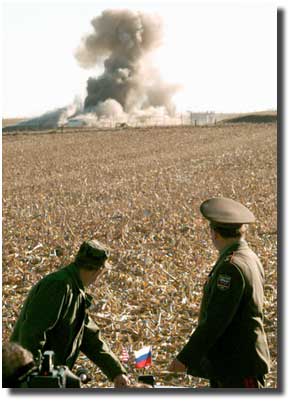
Taking Legislative Aim at Weapons of Mass Destruction(2)
www.americancorner.org.tw | 2012-11-02 09:14

Seize the Opportunity
Even as recent international attention has been focused on the nuclear programs in North Korea and Iran, we need to seize this opportunity to control threats from biological and chemical weapons and to make major breakthroughs in the following areas of nuclear proliferation:
• Bring Russian short-range tactical nuclear weapons into the Nunn-Lugar program. For all the success we have had in deactivating Russian intercontinental missiles and strategic warheads, Moscow has so far refused to discuss tactical weapons, which may be even more dangerous.
• Control nuclear materials worldwide. Large amounts of weapons-grade material outside the former Soviet Union pose a threat to international security. We should accelerate the current international programs to eliminate stockpiles of spent reactor fuel and to convert research reactors to low-enriched uranium.
• Win nuclear agreements with India and Pakistan. The United States should devote sustained efforts to promote confidence-building measures and support the encouraging steps these two nuclear-armed foes have already made, while taking care to adhere to Nuclear Non-Proliferation Treaty obligations.
• Eliminate U.S. and Russian bureaucratic roadblocks to cooperatively securing vulnerable fissile materials and warhead sites. If the two sides are to meet their Bratislava commitments, Russia will have to stop denying access to sites and refusing to provide tax-free status on contributions from participating countries, and it will have to conclude liability protections for G-8 partners.
• Get more U.S. and European companies to hire weapons scientists. The tens of thousands of scientists we have employed are mostly working at government-sponsored or government-subsidized jobs. We must move many more of these men and women into sustainable private sector jobs so they are not tempted to find work helping others acquire dangerous weapons.
• Secure Russian ratification of the Nunn-Lugar umbrella agreement. This agreement, which underpins all U.S. threat reduction work in the former Soviet Union, needs to be formally extended, but President Putin has so far refused to present it to the Duma for a vote. Without its guarantees, which prevent weapons cleanup contributions from being taxed by Russian authorities and protect U.S. contractors from liability while undertaking this risky endeavor, work could come to a halt.
• Finalize a plutonium disposition agreement. At the Bratislava summit, issues of liability continued to stymie efforts to destroy 34 metric tons of Russian plutonium, despite a fresh U.S. push to resolve the matter.
• Increase the pace of activities under the G-8 Global Partnership Against Weapons and Materials of Mass Destruction created in 2002. The United States is living up to its agreement to provide $10 billion over 10 years for weapons cleanup, but our partners in this community of major industrial democracies are still working to meet their equivalent pledge. More importantly, we need to concentrate on turning pledges into projects.
The window of opportunity to address these threats will not remain open indefinitely. Our political leadership and nonproliferation experts must act now to follow up on the recent summit and work with Russian authorities to unlock the last doors to the dismantlement of its nuclear weapons program. I hope Congress will do its part by passing the new Nunn-Lugar bill to eliminate potential obstacles to the Bratislava timetables. Further, we should scour the globe to identify and create opportunities to dismantle dangerous programs outside the former Soviet Union. Only by working night and day to find and eliminate weapons of mass destruction can we fulfill our obligations to protect the American people and, indeed, the people of all nations.
Share this page



















